Question for consideration 1
Thomas Edison is credited with many great inventions and has over 1000 U.S. patents. How do you think one man was able to accomplish so much?
(Please answer this question in your journal before continuing.)
Background
Thomas Alva Edison has been described as the greatest inventor in history. He is credited with the creation of such revolutionary technologies as the electric light, the phonograph and motion pictures as well as many others. However, some people believe that historians give too much credit to Edison and not enough is given to his assistants for these inventions. Your job is to sit as a member of a jury that must decide whether or not Edison deserves all of the credit he is given. Since this is a civil case rather than a criminal case, the burden of proof necessary for a guilty verdict is only more likely than not. (over 50%)
You will be presented with a case for the prosecution that charges that, "Thomas Alva Edison primarily succeeded not because of his own inventive ability, but as a result of the ingenuity and efforts of the many inventors and machinists that worked for him."
The defense will argue that although Edison did have teams of assistants and machinists, he succeed as a result of his own ideas, intellectual ability, leadership and hard work.
The court case will rely heavily on statements from Edison and those who knew and worked with him. Any statements in quotes are directly from the witnesses and those that are not in quotes were developed for the purposes of this case based on the opinions and ideas of the witnesses.
Throughout the court transcript you will occasionally see italicized questions. These questions need to be answered in your journal as you go and will assist you in determining the outcome of the case.
The Case
Opening Arguments
Prosecution: Ladies and gentlemen of the jury, today, we will present you with evidence that will prove to you that Thomas Alva Edison is given more credit than he deserves as the inventor of many of our most famous technologies. I will show you quotes from various individuals and photographs that clearly show the true team environment of Edison's "invention factories." Without the ideas, suggestions and dedication of the many assistants, Edison would not have been as successful as historians contend that he was. Please note as evidence of this "team environment" the photograph labeled Exhibit "A" of Edison and his workers in Menlo Park, New Jersey.
Question for Consideration 2
hat types of responsibilities do you think the people in the photograph labeled Exhibit "A" might have in regards to the work of Edison?
Defense: Good people of the jury, I would like to begin by making it clear that I do not intend to argue that Thomas Alva Edison should be portrayed as a "lone inventor" working in a small, isolated shop. That myth is indeed false. However, I will prove to you that the ideas for the inventions and the solutions to the majority of the problems came from Edison himself. The fact that he was ahead of his time as an inventor and became one of the pioneers of the "research and development" industry does not diminish the credit the man should receive as an inventor. Although there is no patent for it, Edison basically developed and oversaw an inventive process that delegated tasks that were based on his own ideas. The photograph of Edison with his phonograph labeled Exhibit "B" offers you a perfect image of the true nature of the inventive mind of this great man.
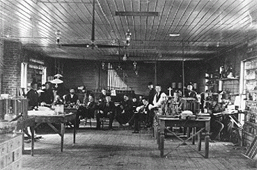
Question for Consideration 3
The Prosecution's Case
What image of Edison and his work does the picture labeled Exhibit "B" portray? How do Exhibit "A" and Exhibit "B" differ in their portrayal of the invention process?
Prosecution: For my first witness, I'd like to call to the stand Charles Batchelor, key assistant to Thomas Edison from 1871 to 1892.
Prosecution: Mr. Batchelor, can you briefly describe how and why you came to work for Mr. Edison?
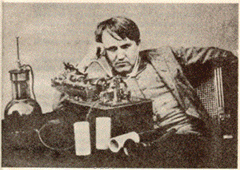
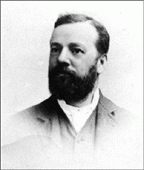
Mr. Batchelor: I met Mr. Edison while working in Newark, New Jersey installing equipment at the Clark Sewing Thread Mills.
Prosecution: Mr. Batchelor, can you confirm that Exhibit "C" is indeed a series of notes that you took in regards to experimenting that went on in Edison's laboratories?
Mr. Batchelor: Yes, these were written by me.
Prosecution: Did you often conduct experiments and take notes on the results?
Mr. Batchelor: There were times when I worked directly with Mr. Edison and took notes on our results and there were times when I worked on a specific problem alone and took notes on my results.
Prosecution: Did further experiments come about due to the results of your experiments?
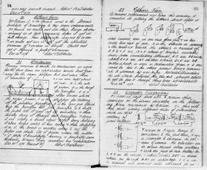
Mr. Batchelor: Yes, of course. That's the idea. All experiments, whether successful or not, provide us with new knowledge and ideas.
Prosecution: So, one can conclude that the final products "invented" by Mr. Edison were directly influenced by your own scientific ability and creative problem solving?
Mr. Batchelor: Yes, that would be a fair statement.
Prosecution: How did Mr. Edison reward you for your contributions?
Mr. Batchelor: He paid myself and a few other assistants with royalties on projects on which we made significant scientific contributions.
Prosecution: I'd like to introduce Exhibit "D" into the records. This document shows how the profits from the production and sale of presses were distributed. Mr. Batchelor, do you recognize this document?
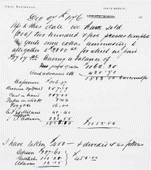
Mr. Batchelor: Yes, I wrote it.
Prosecution: Did Mr. Edison pay royalties to all of his employees?
Mr. Batchelor: No.
Prosecution: Why did yourself and Mr. Adams receive royalties?
Mr. Batchelor: Because we played a key part in the invention, production and sale of the product.
Prosecution: The production and sale of the product? I thought that you were inventors?
Mr. Batchelor: We are inventors. However, the products we invented needed to be produced, which often required specific machines and skilled workers. Edison oversaw the production by opening up his own factories to produce the new products. This also allowed us to easily improve the product through further testing since the factories answered directly to Mr. Edison. He also directly oversaw the sales of many of his products and used assistants such as myself as salespeople. After all, teaching people how to use these new technologies often required someone with firsthand knowledge of the products.
Prosecution: Could Mr. Edison have carried out all of these responsibilities on his own?
Mr. Batchelor: Oh no. Even "the Wizard of Menlo Park" is only human. If he had to spend more time overseeing production and sales on every product, he never would have been able to devote as much time to invention.
Prosecution: Earlier you responded that you played a key role on the outcome of many of Mr. Edison's inventions. Do you think Mr. Edison would disagree with that comment?
Mr. Batchelor: No, I am certain he would tell you the same thing. Myself and other assistants made countless contributions but they were a part of the effort of building off of Mr. Edison's ideas.
Prosecution: Mr. Batchelor, I'd like you to identify the following document for the court.
Mr. Batchelor: This is the Patent document for the incandescent electric lamp.
Prosecution: Did you or any other assistants play a role in this invention?
Mr. Batchelor: Yes, we worked with Mr. Edison on this invention quite a bit. It was an exciting project, as we knew of the potential impact it would have on society.
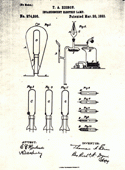
Mr. Batchelor: This is the Patent document for the incandescent electric lamp.
Prosecution: Did you or any other assistants play a role in this invention?
Mr. Batchelor: Yes, we worked with Mr. Edison on this invention quite a bit. It was an exciting project, as we knew of the potential impact it would have on society.
Prosecution: Does the patent document identify the one to receive credit for the invention? If so, who?
Mr. Batchelor: It does. The patent is clearly under Mr. Edison.
Prosecution: Did Mr. Edison do you and the other assistants a disservice by having the inventions patented in his own name?
Mr. Batchelor: No sir! The patent laws of the time period made it necessary to have an invention patented in one name. If you tried to get a patent with multiple inventors you opened yourself up for problems.
Prosecution: So, due to the laws of the time and not because he was the sole inventor providing all of the ideas, Mr. Edison patented most of his inventions in his own name alone. Would you agree with that statement Mr. Batchelor?
Mr. Batchelor: Yes and no...
Prosecution: I have no further questions.
Defense: Mr. Batchelor, if you were not in the employment of Mr. Edison and you were not working on tasks directly related to his ideas, would you have been able to create those inventions that you played such a key role in?
Mr. Batchelor: I'd have to say no.
Defense: Your ideas then, were a direct result of exploring the ideas of Mr. Edison?
Mr. Batchelor: For the most part yes, but we did sometimes brainstorm together to come up with ideas for inventions.
Defense: I have no further questions.
Question for Consideration 4
Based on the testimony of Mr. Batchelor, finish this paragraph: The process of invention was only beginning once a product was invented. After that...
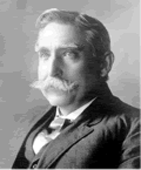
Prosecution: I'd like to call for my next witness, John Ott.
Prosecution: Mr. Ott, can you describe your role in the development of an automatic voltage regulator in 1882?
Mr. Ott: Well sir, Edison provided sketches showing alternative designs and "gave me an explanation how to go to work and make them; also the results that might be noticed, and instructed me to guard against these results and give him a copy of the notes."
Prosecution: What does "Guarding against results" actually mean?
Mr. Ott: "Guarding against results," meant to look for unexpected results that "might lead to an invention."
Prosecution: Let me make sure I understand this. During the invention process you may develop new ideas for inventions while working on experiments for other inventions?
Mr. Ott: Yes, that's correct. As MR. Batchelor testified, part of the invention process is learning from all experiments.
Prosecution: And, if you, Mr. John Ott or any other assistant, are working on these experiments without the presence of Mr. Edison and you see a result that sets off a "light bulb" in your head with an idea for another invention, you pass that information of to Mr. Edison?
Mr. Ott: Yes.
Prosecution: If that idea of yours develops into a separate invention, should you not be the one that gets credit for it? After all, it is your idea!
Mr. Ott: I...I don't know.
Prosecution: No further questions.
Defense: First I'd like to thank the Prosecution for using the "light bulb" symbolism in a case involving Mr. Edison. Now, returning to business. Mr. Ott, correct me if I am wrong but this issue was brought up in a case in which Mr. Edison's patent was challenged because of the significant role you played in the process.
Mr. Ott: That's correct.
Defense: How did Martin Force, another of Edison's assistants, respond to that charge during that case?
Mr. Ott: He testified that Mr. Edison should be considered the inventor "because it was Mr. Ott's business to work for Mr. Edison and put Mr. Edison's inventions into mechanical shape."
Defense: Would you agree with that statement.
Mr. Ott: Yes.
Defense: If you were not following the explicit directions of Mr. Edison would you even have ever seen the results that gave you the idea for the new invention?
Mr. Ott: It would have been very unlikely.
Defense: Thank you Mr. Ott. I have no further questions.
Prosecution: The prosecution rest.
Question for Consideration 5
The Defense's Case
How has Edison's system, in which many tasks were delegated among assistants, been copied in today's Research and Development industry? When a product is produced at a Research and Development company today, who do you think should receive the profits, the company or the scientists?
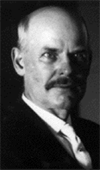
Defense: I'd like to call to the stand Mr. Edward G. Acheson.
Defense: Mr. Acheson, when did you begin working with Mr. Edison?
Mr. Acheson: I joined Mr. Edison's Staff in 1880.
Defense: Did you ever make suggestions for improvements on ideas and inventions?
Mr. Acheson: Yes, I once offered some ideas of mine regarding electrochemical meters.
Defense: How did Mr. Edison reply?
Mr. Acheson:He informed me that I was not paid to make suggestions to him. He explained to me that if he already had an idea in his head and I then suggested the same idea or a similar one, I may think he took it from me.
Defense: How did you respond to him in regards to that issue?
Mr. Acheson: I assured him that "I considered anything I could produce while in his employ and pertaining to his interests, belonged to him; that my thinking on those lines was due to my being in his laboratory and cognizant of his needs and lines of work."
Defense: Could you repeat the part after "belonged to him?"
Mr. Acheson: I said "that my thinking on those lines was due to my being in his laboratory and cognizant of his needs and lines of work."
Defense: To your knowledge, did other assistants share your opinions in regards to this matter?
Mr. Acheson: As far as I know, yes. In fact, one assistant even described him as the "sole directing mind."
Defense: Thank you, I have no further questions.
Prosecution: Mr. Acheson, you seem to make it quite clear that you believe Edison owns your ideas. Am I interpreting this correctly?
Mr. Acheson: I... I'm not sure. "Owns" is a strong word to use when it comes to another persons ideas.
Prosecution: I have no further questions.
Question for Consideration 6
In your opinion, can someone rightfully claim the idea of another? If yes, under what circumstances? If no, why not?
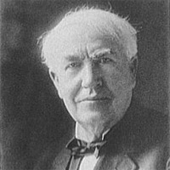
Defense: I'd next like to call to the stand Mr. Thomas Alva Edison.
Defense: Mr. Edison, I'd like to thank you for taking the time from your busy schedule to testify with us today and apologize for these ridiculous charges.
Mr. Edison: Please don't think anything of it. I've been involved in numerous legal battles over my inventions and ownership rights. It's part of the invention industry.
Defense: The industry? Are you implying that the process of invention is an industry in and of itself?
Mr. Edison: Of course! It was not financially feasible to simply sit in a laboratory all day and invent new things. After they were invented, one had to produce products for sale, make improvements on the products, convince the public that the products are beneficial, and sell the products. In the Twenty-first century you would refer to this as the Research and Development industry.
Defense: Were you the first to turn invention into an industry?
Mr. Edison: I won't go as far as to say I was the absolute first, but many historians consider my laboratory at Menlo Park as "a new model that helped transform American invention." I've even been described "as a transitional figure standing between the lone inventor of the nineteenth century and the industrial researcher of the twentieth." (Israel 119)
Defense: How did your design of your Menlo Park facilities change invention?
Mr. Edison: I designed Menlo Park to be an efficient invention facility. I learned from my previous experiences as an inventor and continued to improve the "system" of inventing. One of my biographers explained it very well when he said that, "The Menlo Park laboratory did not mark a sharp break away from the shop tradition of invention. Instead it represented Edison's continuing efforts to elaborate on rather than replace the tradition. At Menlo Park the machine shop continued to be a key element in Edison's inventive style. Now, however, the skilled workmen were able to devote themselves to invention, and the tools that had been used in the Newark telegraph shops were adapted solely for inventive work. This allowed Edison to rapidly construct, test, and alter experimental devices, significantly increasing the rate at which he could develop new inventions. The Menlo Park laboratory was designed to be an ‘invention factory' where Edison planned to produce ‘a minor invention every ten days and a big thing every six months or so." (Israel 119-120)
Defense: I noticed that he stated that, "the machine shop continued to be a key element." What exactly is a machine shop and how important was it to your success?
Mr. Edison: Let me answer your question by asking you one of my own. Have you ever heard the expression, "Invention is 1% inspiration, 99% perspiration."
Defense: Yes, I've heard that. I believe it is a quote attributed to you.
Mr. Edison: Well, when you think of the 99% perspiration, consider the fact that most of that perspiration takes place either in the machine shop or the laboratory. An efficient machine shop is vital to success in the invention process and they are not cheap to come by. At one point, while I was trying to get Western Union to help fund my machine shop, I explained to them that I would, "be compelled to close it unless I am able to provide funds for continuing the same and keep my skilled workmen the loss of which would seriously cripple me." (Israel 130) Fortunately, they agreed with me and provided the needed funding.
Defense: What exactly takes place in a machine shop?
Mr. Edison: There are two key elements in my machine shop. First, you must have the proper machines that can perform the fine detailed work that is often necessary for an invention to work. Secondly, and even more important, one must have "skilled workmen" that can perform the tasks that I ask. I rely heavily on my machinists to turn my pencil and paper ideas into actual working machines.
Defense: So the machinist used your ideas and your instructions to create products?
Mr. Edison: That would be correct.
Defense: How much did you depend on your assistants such as Mr. Batchelor and Mr. Adams?
Mr. Edison: Oh, quite extensively. But I learned that if I focused on directing a large-scale research and development program instead of relying on only a few close associates, I could see more of my ideas come into existence. My assistants provided me with the ability to invent technologies while most of them oversaw the creation of those technologies.
Defense: Does that mean that your assistants were not contributing their own ideas?
Mr. Edison: By no means no! I would simply delegate the work between each staff member or a team of staff members and give them initial guidance and suggestions on how to try to solve the problem at hand. I allowed them and, in fact, encouraged them to find their own way to a solution. In some cases, when I thought that an individual had a great deal of potential, I would refuse to offer advice and force them to find a solution themselves.
Defense: Would you say that your success can be partly attributed to your "invention" of team-based invention system?
Mr. Edison: That would be a fair statement.
Defense: I have no further questions.
Prosecution: Mr. Edison, I have only one question for you. Could you have made the many great inventions that are attributed to you and received over 1000 patents without the contributions, both physical and mental, of your assistants?
Mr. Edison: Absolutely not. They were vital to the success of my invention system.
Prosecution: Thank you, no further questions.
Defense: The defense rest.
Assessment 1
Closing Arguments
Write the closing argument for either the Prosecution or the Defense. A good closing argument will summarize the key points brought up by your side while attacking the arguments made by the opposition. Be sure to refer to the testimony given during the case in your argument.
Assessment 2
In your journal answer the following question again. Thomas Edison is credited with many great inventions and has over 1000 U.S. patents. How do you think one man was able to accomplish so much?